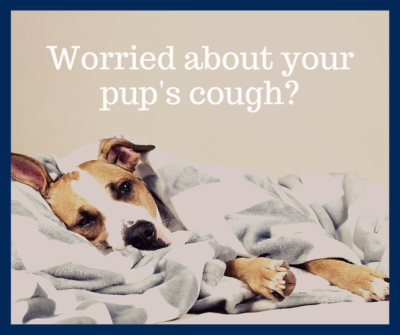Worried about Kennel Cough?

Kennel Cough in Dogs
What is Kennel Cough?
Kennel cough, also known as Canine Infectious Respiratory Disease (CIRD) or Infectious Tracheobronchitis, is an infectious bronchitis caused by bacteria and viruses.
What are the symptoms?
Mild cases of kennel cough may only involve a hacking cough that doesn’t otherwise interfere with your pup’s day to day life; their illness could last a week or two but generally doesn’t require treatment. More severe cases, caused either by the infectious agents or by your pup’s decreased immunity, could progress to life-threatening pneumonia if left untreated. With these cases you may also note listlessness, fatigue, and fever.
*One thing to be aware of is the “reverse sneeze”. At times, people mistake this for a cough but it’s actually a normal occurrence. Check out a video to see if that’s what you are noticing.
How do dogs get Kennel Cough?
Like human colds, kennel cough spreads through aerosolized respiratory droplets or contact with contaminated surfaces like toys, bowls, or other objects. Transmission is most likely to occur in crowded areas (kennels, classes, dog parks, etc.) and areas with poor ventilation.
How would my pup be diagnosed?
In uncomplicated cases, your veterinarian may be able to diagnose kennel cough based on history and symptoms alone. If they suspect pneumonia, they may also take radiographs. In other cases, they may run tests to determine the particular cause of the cough to help guide their treatment plan.
What is the treatment?
Uncomplicated cases will resolve on their own, but may be treated with a cough suppressant to help your pup be more comfortable as they heal. If the case has potential for complication, your veterinarian may prescribe an antibiotic to treat or prevent pneumonia. If the cough persists even with treatment, your veterinarian may look for another underlying condition which could mimic kennel cough upon initial presentation.
Is there a vaccine to prevent Kennel Cough?
Vaccines are available to prevent kennel cough caused by Bordetella bronchiseptica, canine adenovirus type 2, canine parainfluenza virus, canine distemper, and canine influenza. These vaccines are often given routinely as part of the basic puppy vaccine series and subsequent boosters.
Blog post based on information from www.veterinarypartner.vin.com
